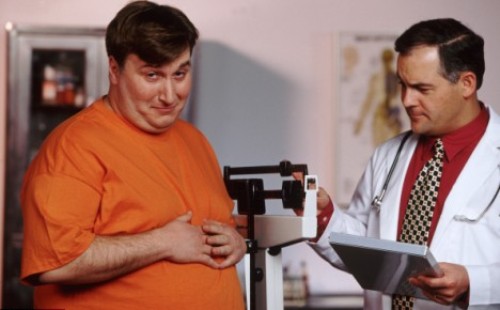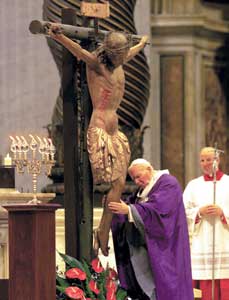Did you know: “Men are more likely to develop high blood pressure, heart disease, cancer and to become dependent upon alcohol than women, yet… men seek medical advice 20% less frequently than women”?
When I was with Fr. John Horgan for a summer at Sts. Peter and Paul, he once said jokingly, “We know many men didn’t go to Confession during the penitential service. How do we know? Your wives told us.” What do you think? Do men go to Confession less than women?
I once had to mediate a conflict between a man and a woman: the man admitted to me in private that he made a big mistake, but wouldn’t admit it her! When I told her this, I said I was perplexed why he didn’t just admit it to her as well, and she said, “It’s probably because of his ego.” Hmm… A good point.
Last week, we talked about how men are designed by God to be strong. Apologizing and admitting weakness, however, makes us feel weak, as if we’ll look badly. For me, I used to hate apologizing, I hated backing down from an argument.
Today Jesus tells us, “Repent,” and this includes admitting we’re wrong and apologizing. This applies to everyone, but in a special way to us men, because we struggle with this. We’re tempted to believe that apologizing makes us weak, but in reality it’s a sign of strength. We all know that when we’re secure in ourselves, we can admit we were wrong. Think about the men you know: if they’re a bit insecure, they feel vulnerable and have to protect what they have.
The most secure people are the saints. And they all repented, because they were sinners like us. In 2000, St. John Paul II asked forgiveness for the sins of some Catholics throughout the centuries and even now. This didn’t make him us look weak. Why? Because our sins are already visible to the whole world. It actually showed his own strength and conviction in the Church’s divinity and so gave him greater credibility.
In preparing for this homily, I reflected on the priests I know personally: those who are able to apologize, admit their weaknesses and mistakes are also the priests who are willing to speak out publicly on controversial issues. But other priests, who never admit their wrong, talk tough about controversial teachings but never actually speak up. One of the strongest priests I know was never afraid when students questioned him in class; he could take it because he had so much self-confidence. He was also comfortable taking positions that weren’t popular, or going public on things that most people shied away from. It was he who taught me that it’s okay to be weak, and that being comfortable with our weakness gives us incredible strength.
I’ve tried to apply this lesson even publicly. Years ago, I gave a homily in which I quoted something my mother said. It was only later on I realized that, while it had some truth to it, it wasn’t very clear and could be easily misunderstood. So I had to admit it wasn’t correct, and I had to change my opinion. Let’s put it more bluntly: what I said was wrong! At least partially wrong. And you know what? That’s okay.
We all know these things, they’re obvious. But sometimes they’re not enough to compel us to change. For me, there were two factors that really got me to say, “Enough is enough. I better learn to apologize.” 1) I saw how things would spiral out of control when people didn’t apologize. I hated, for example, seeing my parents not talk to each other for days because one of them wouldn’t apologize. It was so silly. Why not just apologize and make up? Afterall, we all know who made the mistake. There are only five of us in our house! This happens in a number of families: relatives don’t talk to each other maybe for years because someone said something and won’t apologize. 2) When I saw the bravado and arrogance in other men, I honestly couldn’t stand it. But then I realized that I was like that too and I didn’t want to be like that. These two factors really motivated me to change.
When we admit our weakness, no one can touch us, no one can criticize us! Why? Because we’re not interested in appearing perfect. We’re not! We’re only interested in the truth: if we do something good, great! Praise God! If not, we readily apologize, change, and become more like Jesus. Doing so only make us better, and makes us less dependent on what other people think of us.
Let me end by saying something about my father. For most of my life, my father wouldn’t readily admit he was wrong. Even when our whole family knew it, he wouldn’t say it. And it hurt him and it hurt us. But after his conversion, he started going to Confession. One time, when he visited me in New York, I went to confession to Msgr. O’Brien, and then my dad went afterwards. Seeing my dad humble himself was inspiring to me, because I saw that he was more sure of himself. And seeing Msgr. O’Brien love my dad and be kind to him meant a lot to me. Here were two strong men.
My father was so much stronger as a man after his conversion: things didn’t bug him as much and he was so much happier. Apologizing is a sign of strength.